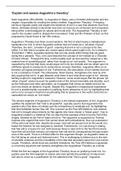‘Explain and assess Augustine’s theodicy’
Saint Augustine (354-430AD), or Augustine of Hippo, was a Christian philosopher and the-
ologian, responsible for creating the widely credited ‘Augustinian Theodicy’. A theodicy
serves to logically justify and explain the existence of evil in a way that absolves God from
blame, ultimately aiming to illuminate how God can exist as an omniscient and omnipotent
being within a world plagued by natural and moral evils. The Augustinian Theodicy is still
used in the modern world to dispute the Inconsistent Triad and the Problem of Evil, as first
proposed by David Hume in the 18th century.
Augustine’s Theodicy has three crucial sections, the first of which being a metaphysical
explanation for evil, in which Augustine outlines that evil exists as a “privation of good”.
Therefore, the term, “privation of good”, meaning that evil is not a concept of its own,
rather, it is that which occupies any vacant space where good ought to be. As is stated in
‘Enchiridion’ (1683), Augustine teaches that evil only exists within things that are good,
acting like a parasite. Thus, one could describe the concept of evil instead as a ‘Disorder
of Good Virtues’. Through this lens, a sinful quality such as lust could be viewed as a ‘dis-
ordered love of something good’ rather than simply as an ‘evil quality.’ This argument is
supported by the fact that many would argue evil is far too intricate and too reliant upon its
antithesis (good) to merely be an autonomous concept, therefore, Augustine offers an al-
ternative yet logical perception of evil. Furthermore, this description of evil clarifies that evil
is not a substance in itself. The philosopher, Brian Davies, strengthens this view by simi-
larly arguing that evil is “a gap between what there is and what there ought to be”, thereby
lending support to Augustine’s viewpoint. However, some would argue that the phrase “pri-
vation of good” cannot account for greater evils of the utmost immorality and brutality, such
as the Holocaust and other genocides, as it suggests that crimes as hateful and evil as
such are simply an absence of good. Despite this, Augustine’s metaphysical explanation
for evil is predominantly successful in justifying God’s allowance of evil, by highlighting that
evil is not a concept in itself and accentuating that its presence in this world cannot be en-
capsulated as simply as “evil exists.”
The second segment of Augustine’s Theodicy is the biblical explanation of evil. Augustine
qualifies the statement that ‘God is all-powerful’, typically used to fuel arguments that
question why God does not simply use His omnipotency to eradicate evil, by highlighting
that God facilitates human free will. This is known as the Free Will Defence, and outlines
that evil is brought about directly by free agents who have chosen a “lesser good”. Due to
Augustine’s belief in a historical Fall, he cites the first example of this to be the Fall of the
Angels, followed by the Fall of Adam and Eve. This argument is supported by Thomas
Aquinas who argued that even God cannot enact self-contradictions, thus our possession
of free will must mean that, despite His power, God will not prevent evil as this would con-
tradict the freedom he has assigned to mankind. Furthermore, it is convincing in stating
that free will is a reason for evil, both because there is clear truth to the fact that humans
have free will and that humans can observe free will and its consequences through experi-
ence of the world. There is a limited effect to this argument though, as Augustine relies on
the Fall being an actual and historical event. This is challenging to believe due to the lack
of scientific evidence and the incredibility of the idea that all people came from one human
couple. Therefore, whilst there are scientific limitations, the Free Will Defence is generally
a convincing argument and certainly strengthens the Augustinian Theodicy as a whole.
Whilst the first two stages of the Augustinian Theodicy focus on justifying moral evil, Au-
gustine uses the third segment to reason why God permits the existence of natural evil
and also to serve as a qualification for the statement that “God is good”. Augustine




